| |
|
|
KICHWA NATION OF SARAYAKU
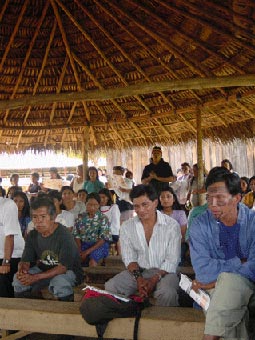 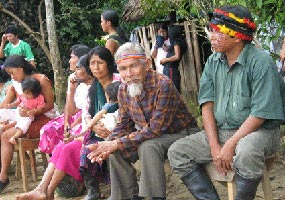
Sarayaku is an Indian
village situated in the Amazonic region of Ecuador. It host some
1,200 inhabitants who have preserved a traditional way of life based
on hunting, fishing, and farming.
They call themselves the Kichwa Nation of Sarayaku and live next
to other indigenous peoples such as the HUARORANIS, the SHUARS,
the ASHUARS, etc…
The Kichwa nation of Sarayaku lives on the banks of the Bobonaza
River in the Pastaza province. Their ancestral territory covers
about 135,.000 hectares for which they were given collective property
deeds by the Ecuado government.
Up to now it entirely depends on the resources offered by the tropical
forest. It still relies on plants for food, medicine, ornaments
and rituals, and wood for houses, canoes, household equipment and
tools.
Sarayaku has its own traditional government based on extremely evolved
democratic principles.
The Amazonian
Forest
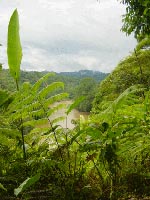 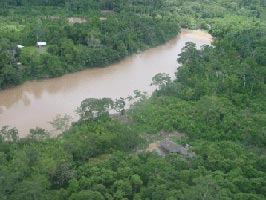
With the forst located
in Peru, the Ecuadorian forest is probably the richest in the world
in terms of vegetal biodiversity with its 10,000 odd plant species.
It also harbours a great diversity on terms of fauna.
Since the 1960s South American governments relying on the support
of the World Bank and other international bodies have grand ‘development’
projects for Amazonia: road building, cattle breeding, monocultures,
logging, oil pumping, etc.
In this case ‘development’ is synonymous with destruction
of the environment and culural genocide. Many Indian peoples have
already vanished. And we know that this amounts to as many libraries
destroyed.
Reclaiming territories
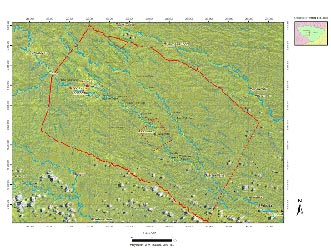 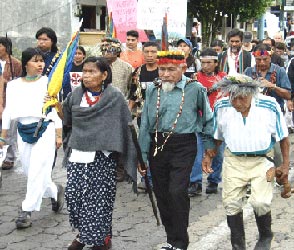
In 1992 indigenous
nations of Amazonia left the forest in an impressive march on Quito.
After walking some 500 km they reached the capital of the state,
high up in the Cordillera.
They stayed there for weeks, sitting on the city’s main squares,
until they were allowed into the Palace of the Government to negotiate
dramatic changes in the Ecuadorian Constitution. Ecuador became
a pluricultural state that acknowledges specific rights to its indigenous
peoples.
The Sarayaku inhabitants were granted official property deeds on
their territory, which was an undisputable historical improvement.
The subsoil can still be exploited for reasons of national interest,
but they have to be consulted and reach a collective agreement.
THE YACHAKS
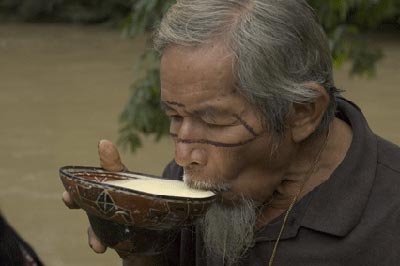 Yachaks
is the name the Kichwa people of Sarayaku give to their ‘shamans’.
The function of Yachak is difficult to describe and understand for
Westerners. Yachaks
is the name the Kichwa people of Sarayaku give to their ‘shamans’.
The function of Yachak is difficult to describe and understand for
Westerners.
A Yachak is first and foremost a moral authority, a ‘wise
man’ who has gone through a long and trying initiation. He
is a strong structuring component in the community, both a spritual
guide, a social reference, and a healer. As he transmits his knowledge
to younger generations he contributes to perpetuating and maintaining
his people’s cultural identity.
Several disbelieving travellers, among whom many anthropologists,
were amazed or even astounded by what the Yachaks can achieved.
Unfortunately some sort of fashion has developed which has led to
the proliferation of false ‘shamans’ both in South America
and in the Western world and a consequent skepticism towards the
genuine knowledge of the people of the forest.
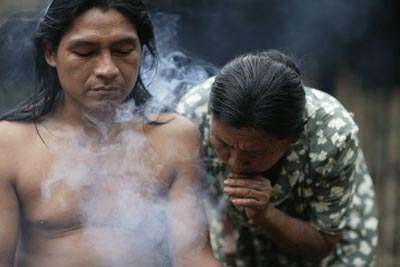 Elders
now endeavour to connect and fight such shams. They must also counter
young people’s turning away from tradition and trials which
they deem to difficult. Elders
now endeavour to connect and fight such shams. They must also counter
young people’s turning away from tradition and trials which
they deem to difficult.
These various reasons jeopardize knowledge that has been accumulated
for hundreds of years. In Sarayaku there are still about ten Yachaks,
who have decided to act in order to maintain their lineage and their
knowledge. Some of them, like Don Sabino, initiated the present
project
|
|
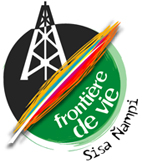






 Yachaks
is the name the Kichwa people of Sarayaku give to their ‘shamans’.
The function of Yachak is difficult to describe and understand for
Westerners.
Yachaks
is the name the Kichwa people of Sarayaku give to their ‘shamans’.
The function of Yachak is difficult to describe and understand for
Westerners.  Elders
now endeavour to connect and fight such shams. They must also counter
young people’s turning away from tradition and trials which
they deem to difficult.
Elders
now endeavour to connect and fight such shams. They must also counter
young people’s turning away from tradition and trials which
they deem to difficult.